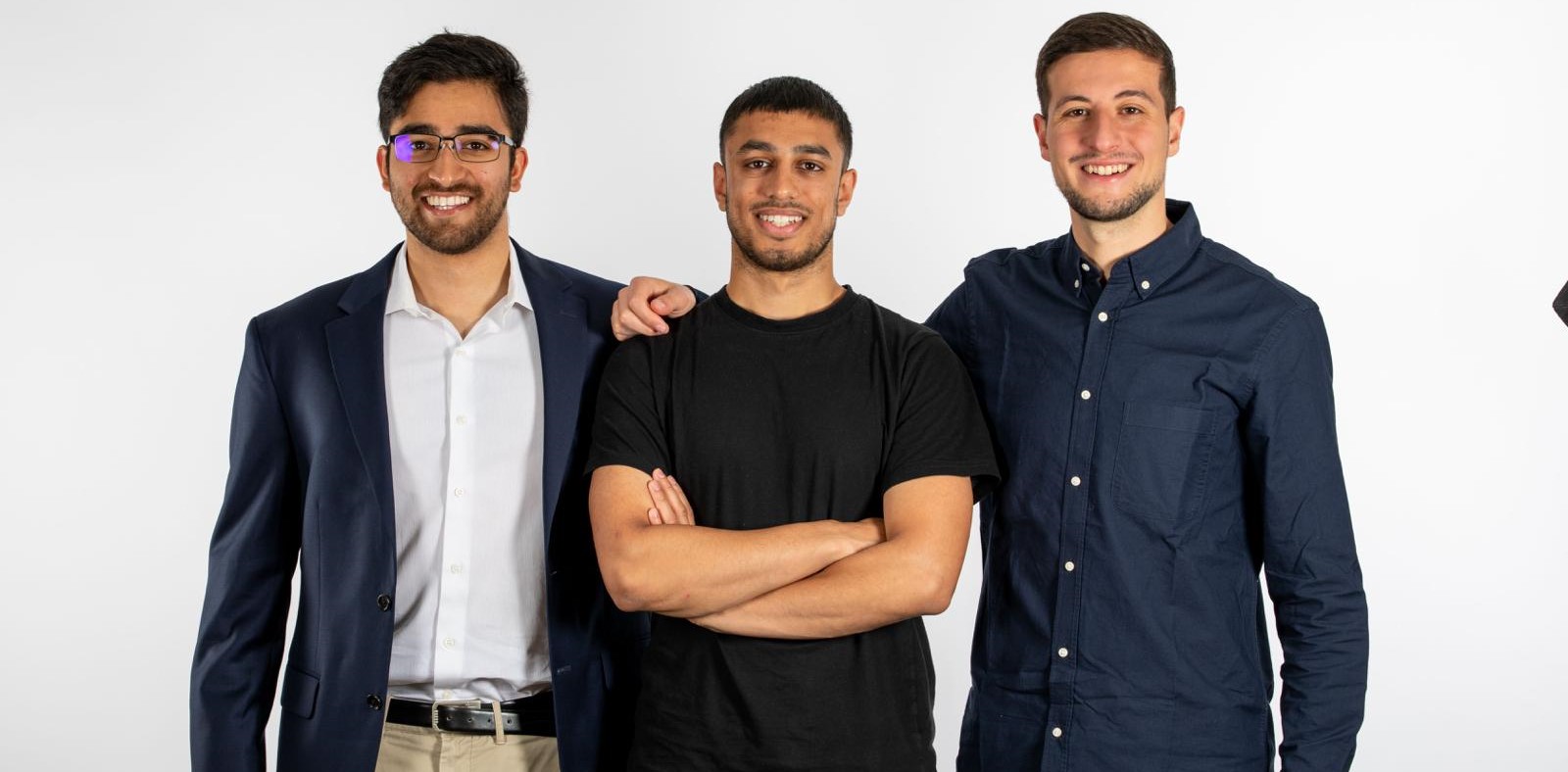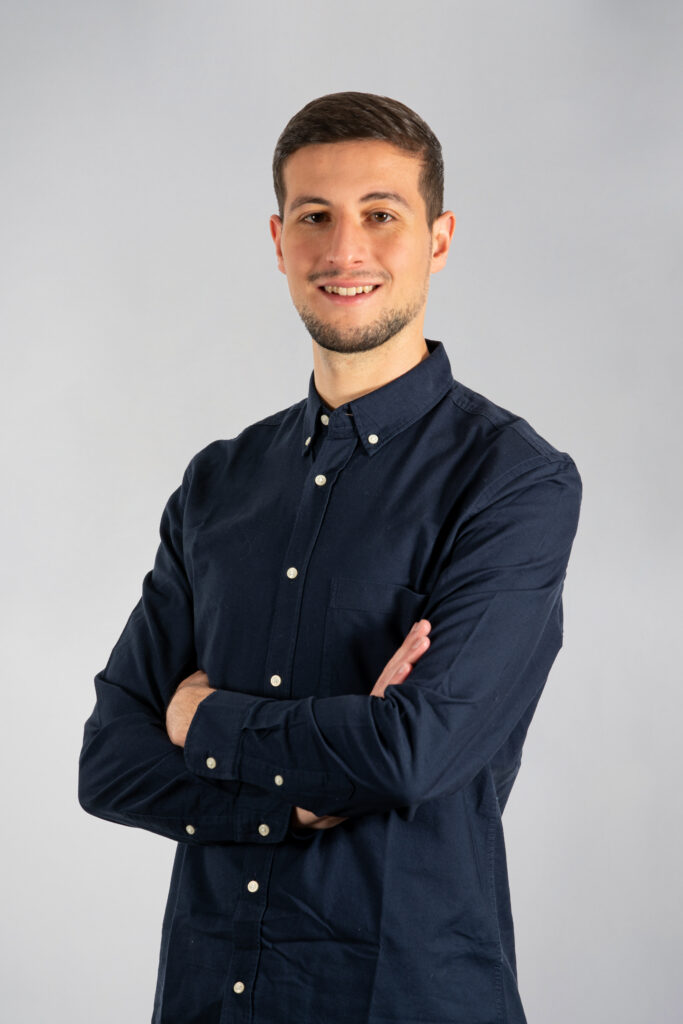Meet Yusef Iskandar from Roger
Q: Can you introduce yourself and tell us about your startup, Roger?
A: I’m Yusef, born and raised in Germany with a Chaldean-Assyrian background. My academic journey in Germany led me to study mechanical engineering. Eventually, I moved to the U.S. to study computer science. I’ve always been fascinated by startups, immersing myself in books, YouTube channels, and all things entrepreneurial. This interest led me to choose my university roommates carefully, aligning with my startup ambitions. That’s how I met my co-founders, and together, we started brainstorming ideas. This collaboration birthed Roger.
Roger is designed to support home health nurses. These nurses perform health checkups at elderly people’s homes, and our focus is on automating their documentation process. By doing so, we significantly reduce the time they spend on paperwork after visits, making their lives easier and more efficient.
Q: How did you integrate the medical aspect into Roger, considering your engineering background?
A: The medical aspect was initially foreign to us. We had to dive in and learn everything from scratch. I took a more active role in understanding the medical side, drawing insights from my sister, who works in the medical field. We dedicated ourselves to extensive research and learning on-the-go, gradually integrating this crucial knowledge into Roger’s development.
Choosing Skydeck as the Accelerator for Roger
Q: Why did you choose Skydeck as your accelerator program?
A: Skydeck caught my attention while in the U.S. I was a Berkeley alumnus, having spent a semester there as part of my studies. During that time, we had a site visit to Skydeck’s office. They introduced us to the program, encouraging us to apply for their batch. This visit left a lasting impression on me.
After starting Roger, I remembered Skydeck as an intriguing accelerator option. Having been there and seen it firsthand, I felt it was a good fit for us. It seemed like a natural step to take advantage of this opportunity, so we decided to apply, and that’s how we got involved with Skydeck.
How a Founder Gets In
Q: Could you describe the application process for Skydeck?
A: Yes, the application process for Skydeck was quite structured. Initially, it involved filling out a form, which is standard for most applications. We detailed our market, the problem we’re addressing, and included a slide deck. There was also an option to submit a founder’s video, which we chose to do. This was just the first round, and typically, over a thousand companies apply at this stage. The next stage was the first interview. It was an intense session with about five to six people on the call, including the fund manager, which was quite surprising. We had about five minutes to present our idea and slides, followed by a question-and-answer session. To be honest, our first interview didn’t go very well. At that time, we weren’t entirely confident about our specific idea and hadn’t fully de-risked it. This made it challenging to articulate our vision clearly.
Despite the rocky start, the fund manager reached out to us with several follow-up questions. This gave us the opportunity to provide more detailed information about our project via email. We were then invited to a second interview, which lasted around 50 minutes. This time, we delved deeper into our concept, even showcasing a demo of our product. This more in-depth interaction helped us significantly in the application process.
Understanding Skydeck’s Funding Approach
Q: How does Skydeck handle funding for startups in the program?
A: Skydeck has a straightforward approach to funding. Once a startup is accepted into the program, they present you with a document to sign, which is essentially a SAFE (Simple Agreement for Future Equity) agreement. This agreement typically offers $200,000 in exchange for 7.5% equity in the startup. After signing this agreement, the funding process is quite prompt. You can expect to receive the funds in about one or two weeks. They are very efficient and stick to their commitments.
A Day in the Life at Skydeck
Q: Can you describe what a typical day was like in the Skydeck program?
A: A day at Skydeck was both interesting and varied. Their office is situated in the heart of downtown Berkeley, which added to the experience. The program is structured in different phases. For instance, from the beginning of May until mid-June, we were immersed in numerous workshops. There was a brief summer break, followed by more workshops and sessions in August. A typical busy day involved attending these workshops, which covered a range of topics like go-to-market strategies, marketing, product design, and more. These sessions were highly informative, especially for those of us with limited experience in certain areas. A workshop would typically start at 9 am and last until about 10:30 am. Lunch was provided by Skydeck around noon, fostering a community environment. In the afternoon, there were often fireside chats scheduled around 2 pm, featuring interviews with VCs or industry experts. These chats would go on till about 4 pm. Between these scheduled activities, we focused on working on our product. While we attended most workshops, we occasionally had to skip some due to time constraints and the need to prioritize product development. So, it was a mix of learning, networking, and hands-on work.
The Highlight of Skydeck: Demo Day
Q: Was there a standout moment or feature in the Skydeck program that you found particularly noteworthy?
A: Definitely, the standout moment for us was the demo day. It’s a significant event where all batch companies present their ideas and products in a large hall filled with hundreds of angels, investors, and visitors. Preparing for this day was intense—we set up an attractive booth and worked hard on our presentation. It was an exhilarating experience to organize and receive feedback from a diverse audience. What made demo day truly special was the opportunity it provided for networking. It’s not every day you get to interact with such a wide array of potential investors and industry experts. Skydeck facilitated these interactions by connecting us with interested parties through email. They had a system where investors could scan a QR code to express interest in specific companies. Post-demo day, we had a list of about 30 potential investors, all from demo day interactions, to discuss further funding opportunities. This feature of the program was incredibly valuable for us.
Areas for Improvement in Skydeck: The Advisor Matching System
Q: Were there aspects of the Skydeck program that you found underwhelming or that could use improvement?
A: One area that could use improvement in the Skydeck program is the Advisor Matching feature. Skydeck has a pool of around 500 advisors, and at the beginning of the program, startups are given the chance to choose advisors who are supposed to be well-aligned with their field. However, my experience with this feature was mixed. There were instances where the advisors didn’t seem to take their role seriously or offer particularly useful advice. This inconsistency can be challenging, especially considering the vast number of advisors involved.
On the other hand, it’s not all negative. We did find an advisor through this program who has been incredibly helpful and is now even on our cap table. So, while there are opportunities for positive experiences, the variability can be significant. In short, the Advisor Matching system could benefit from more consistent quality control to ensure that all participating startups receive valuable guidance and mentorship.
Q: Do you mean advisors in the sense of mentors as well?
A: Yes, these advisors essentially act as mentors. For example, in our case in the home health industry, our advisor is a director in this field. This means they have a high-level overview and can offer insights and guidance based on their experience. They might suggest improvements or new directions based on what they’ve seen in the industry. This type of coaching and mentoring is particularly valuable for young startups like us, especially when we’re not originally from the industry we’re entering.
Skydeck’s Role in Roger’s Success
Q: Do you believe that Skydeck has played a significant role in your current success? Would Roger be where it is today without their contribution?
A: Absolutely, Skydeck has been instrumental in our journey. Their impact goes beyond just funding or networking; it’s about the methodology they instilled in us. Without Skydeck, we might not have developed such a systematic approach to customer discovery. During our time there, we actually pivoted our strategy and conducted numerous customer calls, adhering to a very scientific method to understand our next steps. Skydeck also facilitated many valuable introductions, connecting us with people in their extensive network. This access was invaluable for us. Moreover, having external perspectives from seasoned professionals in the Skydeck community helped us to see our work in a new light, providing insights we might not have considered otherwise. Their influence has been a crucial factor in shaping our strategy and guiding our progress to where we are today.
Maintaining Connections Post-Skydeck
Q: Has your relationship with Skydeck continued after graduation? Do you still maintain connections and feel comfortable reaching out for advice?
A: Yes, our relationship with Skydeck has definitely persisted beyond the program. Consider this: we graduated from Skydeck in October, and just last week, we had a call with the fund manager. This indicates an ongoing relationship that seems like it will never end, which is fantastic. The fund manager remains keenly interested in how we’re doing and whether we need any assistance. He’s proactive in reaching out to us, and whenever we have questions or need advice, we don’t hesitate to contact him. It’s mostly the fund manager we interact with, but depending on our needs, he connects us with other relevant people in the network. This enduring support system is incredibly valuable and a testament to the lasting impact of Skydeck on its graduates.
Essential Advice for Aspiring Skydeck Applicants
Q: Finally, could you share any advice for startups looking to apply to Skydeck or similar accelerators?
A: One of the most valuable resources for us was the content from Y Combinator. Their videos and materials are extremely insightful and helpful. The key takeaway, I believe, is the importance of talking to your users. They are your source of truth, and they’ll guide you in understanding whether you’re on the right path. Embracing the concept of ‘failing fast’ is also crucial. It allows you to quickly identify what works and what doesn’t, enabling more rapid progress. In addition, it’s vital to think about your next steps. For instance, when we moved to Skydeck, we gained more traction and were able to collaborate with an expert in AI, Bekir Ozcan. Bekir’s profound expertise led to an accuracy of more than 85% for our AI system, a critical factor in ensuring patient health and well-being. This advancement under Bekir’s guidance significantly enhanced our positioning for securing new funding opportunities. Bringing in outside experts like this can be a game changer. So, my advice is to continually talk to users, be prepared to fail fast and learn from it, and don’t hesitate to seek external expertise when needed. This approach will serve you well in accelerators like Skydeck and beyond.


